- Home
- Steven Brust
Sethra Lavode (Viscount of Adrilankha) Page 31
Sethra Lavode (Viscount of Adrilankha) Read online
Page 31
Aerich spoke in a whisper, saying only the word “Tazendra.”
“I will attend her,” said Pel.
Piro and his friends remained in the background. Ibronka looked at what remained of the brave Dragonlord Kytraan, whose blood was thick upon the cave floor, and at the loyal Iatha, and the steadfast Belly, and, sobbing softly, wrapped her arms around the Viscount, who, in turn, held her close—nor were Piro’s eyes devoid of tears. Neither of them, at this time, seemed to find it necessary to say anything. Röaana and Ritt joined them in their silent commiseration. Tsira, who had been pushed back and away by Piro, tactfully removed herself from the cave, where she sat down on the grass outside along with Lar and Clari, looking at the strange artifact that had led them there, and wondering.
Pel spoke from the back of the cave. “Tazendra is dead,” he said in a voice quavering with emotion. Khaavren bowed his head. Tears filled Aerich’s eyes.
“So I had thought,” he murmured.
“So is Illista,” said Pel, who returned at that moment and knelt next to Aerich.
“It is past time for that one to be dead,” said Khaavren.
“Yes,” said Pel.
Khaavren looked over at their other enemy, and said, “I regret to say, Grita is dead as well.
“You regret it?” said Pel.
“Her death was too easy.” His voice was heavy with pain and bitterness.
“Judgment,” said Aerich, still whispering, “of which vengeance is a sequent, is the rightful province of the Lords of Judgment. And unless one accepts the superstitions of the Easterner, it is their only proper province, therefore it ought to be left to them.”
Khaavren chuckled without humor. “I shan’t begin an argument with you now, my friend.”
“That is right,” whispered Aerich.
Khaavren frowned. “We must find a physicker for you, Aerich,” he said, “for it seems you must be badly hurt. You have not moved so much as an inch since we came through the Necromancer’s gate.”
“Useless,” said the Lyorn with his accustomed coolness. “My neck is broken.”
After an instant of stunned silence, Pel bowed his head, and Khaavren sobbed, making no effort to conceal the emotion which overwhelmed him.
Sethra Lavode knelt down next to the Lyorn and touched his face with her hand, then rose and, addressing the Necromancer, said, “Come, let us return to the city. We may teleport again, and there is still a battle to be won.”
Khaavren, his face wet with tears, looked up at the Enchantress and said, “Warlord—”
“No,” said the Enchantress. “Remain here with your friends. I will take upon myself the safety of Her Majesty until you return. When you are ready to leave, inform Her Majesty; I will have a teleport ready for you and your friends.”
Khaavren bowed his head in silent gratitude. Sethra Lavode approached Piro and squeezed his shoulder; then she and the Necromancer vanished.
Piro disengaged himself from Ibronka, walked over to his father, and clasped his shoulder briefly. The Viscount then saluted the dying Lyorn, a salute which Aerich, as well as he was able, returned with his eyes. Then, as Pel had done to Tsanaali, Piro wiped his blade clean on Grita’s clothing and sheathed his sword.
“Come, my friends,” said Piro. “Let us take our dead comrades out of this cave, and leave my father and his friends in peace.”
Working together, they quickly brought the bodies from the cave, Piro carrying Kytraan’s head, and set them on the grass, Piro depositing his gruesome burden next to the truncated corpse that had been his friend. This done, Ibronka again came into the Viscount’s arms.
“There is blood on my hands,” said Piro.
“It doesn’t matter,” said Ibronka, softly.
He wrapped his arms around her. “The daylight is too bright,” he said. “The breeze too soothing, the temperature is too mild. It is all so wrong.”
“I understand,” said Ibronka.
“Kytraan …”
“Yes.”
“We went through so much, and then, to have him killed so casually, so quickly, almost as if he were nothing.”
“I know,” said Ibronka.
“As if he were nothing,” Piro repeated.
“I know,” said Ibronka.
Piro looked up suddenly. “Röaana, are you all right?”
Röaana, who wore something of a stunned expression, looked at him and nodded slowly. “Yes, my lord, I am well enough. But—Kytraan, and Iatha, and Belly, and Tazendra, and now, it seems, Aerich.”
“I know.”
“I am the only one left,” said Ritt, suddenly, sounding surprised.
Piro frowned. “The only one?”
“Do you recall that day when we met, when Wadre was leading us?”
“I am unlikely to forget it,” said Piro.
“It seems like an age ago, and yet, it has been less than two years.”
“That is true.”
“And of that band, I am the only one still alive.”
“We have come through much together,” said Piro. “All of us.”
“Yes. And now what?”
Piro shook his head, his eyes coming to rest on Tsira, and on the amulet she still held in her hand, the amulet that had brought them there. He considered the strange twists and turns of fate and wondered if anyone could ever know to what his decisions would lead him. “Now? As to that, I cannot say.”
Inside the cave, Khaavren said, “Are you in pain, my friend?”
“No,” whispered Aerich. “I feel nothing. I regret that I cannot move, for I should like to press your hand, Khaavren, and yours, Pel.”
“Yes,” said Khaavren.
“I had never,” said Pel, “truly believed that our friendship would ever end.”
“Nothing is forever,” said Aerich.
“It is one thing to know that, it is another to believe it.”
“I understand,” whispered the Lyorn. “For my part, well, I regret Tazendra. She had more to do.”
“As did you,” said Khaavren with a choked voice.
“Oh, I? I have no regrets for myself. I have had a good life, and our friendship has been the best part of it. Except for Tazendra, I have no regrets.”
With effort, Khaavren suppressed his sobs, but could not keep the tears from his face.
“There is nothing in life like friendship,” said Aerich. “Ours has been good. We have all been lucky.”
“Yes,” said Pel. “We have been lucky.”
Aerich turned his eyes to Pel and he said, “I am glad you know it, my friend.”
His eyes closed, and his breathing became more shallow, and for a moment Khaavren thought he was already gone, but then his eyes opened again.
“You must bring Tazendra to Deathgate,” said Aerich, his voice now even more faint.
“Of course,” said Pel. “And you as well, Aerich.”
“Oh, I, well.” Something like a smile spread over his countenance. “I had never before realized the degree to which my conversation would be hindered by an inability to shrug.”
Khaavren pronounced his name, “Aerich,” again, as if it were an invocation.
Aerich smiled once more, very gently, and then he closed his eyes as if to rest, and his breathing stopped. Khaavren and Pel remained by his side, unable to move.
Outside, they bid a farewell to Tsira, who, still in something of shock, returned to her home. Lar and Clari remained silent, as stunned, we should say, as any of the others, for grief and horror are no respecters of class or House.
Some few minutes later, Pel and Khaavren bore Aerich’s body out, and laid it on the ground next to Iatha. Then they returned an instant later with Tazendra’s.
Piro embraced his father, and said, “My lord the Count, I am sorry for your loss. I have some conception, I think—”
“Yes,” said Khaavren shakily. “And I grieve for your loss as well, Viscount.”
“We should see to our friends,” said Piro.
&nb
sp; Pel nodded, and, when he spoke, there was an edge to his voice, as if only by pretending to coldness could he force himself to speak. “We will return them all to the city, for now. We must get the oils on them soon if they are to be preserved for Deathgate.”
“And then,” said Khaavren, “it would please me immeasurably if you were to return home.”
“It is kind of you to offer,” said Piro. “But what of my friends?”
Khaavren glanced at them and, with an apparent effort, he managed something of a smile. “If they like, they may have positions in the Phoenix Guard. I can always set them to chasing bandits.”
Piro’s own smile came and went like an errant breeze on a still day. “And Ibronka?” he said.
“She is welcome,” he said. “I have no more objections to make; my conscience is dead now.”
Piro bowed.
“Let us return to the city,” said Khaavren.
Chapter the Ninety-Eighth
How the Battle of Adrilankha Ended,
And Khaavren Received an Order
After the destruction of Tri’nagore by Morrolan, and the expulsion of the Jenoine by Sethra Lavode and the Necromancer, well, it should come as no surprise to the reader that it became a different battle—if such a rout can, indeed, be called a battle at all. The fact is, history records few such one-sided contests as the latter stages of the Battle of Adrilankha.
When Sethra and the Necromancer returned, Sethra did not at once resume command, but, on the contrary, permitted her apprentice to continue for some time while she, that is to say, the Enchantress, made certain she understood the tactical situation.
The battle, at this time, was still continuing on three fronts: the bridges, Lower Kieron Road, and the Old West Road. We trust the reader will permit us to quickly investigate each of them.
To consider the last first, it was here that the efforts of Lord Brimford were most successful, for the simple and obvious reason that the Old West Road runs directly through heavy forests for much of its length after leaving the city. And it happened, moreover, with astonishing speed. As Brimford later expressed it, “I knew Tri’nagore was dead a minute after it happened. Two minutes later the animals in the jungle knew. Ten minutes after that, the enemy knew.”
The result was that, in addition to the Imperial Army, Kâna’s forces had to contend with bears, wolves, tiassa, and, above all, green-snakes—these latter being not, in fact, so dangerous as the others, but more than making up for this in the fear they inspired. The Warlock remained in his position behind the headquarters pavilion, taking food nor drink, nor so much as opening his eyes; but General Brawre, in command of Kâna’s forces there, was constantly required to bring fresh units up as old units became demoralized even before facing the enemy. And of course, the more demoralized his forces became, the more correspondingly enspirited were the Imperial forces. By the third hour after noon, Brawre was being pushed back, and in danger of being routed.
On Lower Kieron Road General Izak was, at least at first, having things more his own way; indeed, he was having considerable success in driving the Imperial forces backward, although he had not broken them. The fighting around the new-built forts was especially intense, as Sethra the Younger had decided this was as far back as she wished to be pushed, and, as Izak was young and aggressive and had no mind to be stopped, the battle had reached a fevered pitch. This situation changed abruptly at around the third hour, however—that is to say, when the Jenoine was at last banished. This change was marked by thunderclaps, flashes of light, and fires: in short, all the indications that sorcery was working once more, and the Sorceress in Green was wasting no time in using it.
The effect was not instantaneous: the sorcerers still did not entirely know how to most effectively use their abilities, and Izak’s troops continued to feel that the day ought to be theirs (and it is well known that such beliefs on the part of an army create their own truths); but the effects could not be denied, and, very gradually, over the course of about half an hour, the battle turned. By the fourth hour, Izak was forced to admit that his army was in retreat, and to send Kâna a message to that effect.
The bridges, we should say, were never in danger after the moment, referred to earlier, when Daro made her famous charge. There were simply too many defenders for the attackers to break through on such a narrow path. When the additional forces from the Northgate Road arrived, Taasra sent half of them down the long stairways to the harbor, where they took small boats across the mouth of the river to come up on the Islanders from behind.
It took over an hour for this maneuver to be completed, but when it was, the results were nothing short of spectacular. In ten minutes, the battle had turned around, and by the fourth hour after noon the Islanders were utterly broken. Some of them escaped Adrilankha to the north or the east, and others managed to get back to their boats (which, because of an oversight, had not been burned), but many were forced to surrender, the condition of their release being negotiated between Her Majesty and the King of Elde over the subsequent weeks.
When Sethra finally resumed command, she at once took several regiments and sent them out under Sethra the Younger by the Northgate Road to strike Brawre’s troops in the flank. This maneuver was entirely successful; in ten minutes Brawre would have had trouble finding a corporal’s guard for an escort. Of course, he had no need of such a guard, as he, himself, was a prisoner, along with more than two thousand of his troops.
We should interrupt our discourse at this point by observing that it was at just about this time that Kâna turned to his cousin and said, “We have lost.”
“How is that possible?”
“I do not know. They must have found a way to expel the Jenoine before Tsanaali could take the Orb.”
“My dear cousin—”
“Well?”
“I, for one, am of no mind to be captured.”
“With this, I agree.”
“And then?”
“Let us send messages to Grita and Illista—I believe we owe them at least that courtesy.”
“Now it is my turn to agree with you. And after that—?”
“I know a place not far from here where we will not be found. The host is loyal to us, and it is well off the main road. Furthermore, the army will not reach it for at least a day. We can rest there for a few hours, and then either make our way east, or perhaps escape to Elde.”
“I do not believe the King of Elde would be glad to see us.”
“Greenaere?”
“That is a better idea. Come, write the messages, and I will give orders for our horses to be saddled.”
“Very well.”
Sethra the Younger left a reasonable guard to march the prisoners back to the city (where they were all released over the next few weeks after taking an oath of loyalty to the Orb and the Empire), after which she continued on to perform the same attack on Izak’s corps. This was less successful, for the simple reason that, by the time she launched her attack, Izak was already retreating, with two cavalry regiments in pursuit.
By the fifth hour after noon, everything was, in effect, over. When Sethra the Younger returned, she bowed to the Enchantress, who returned her salute and said, “It looks as if matters are under control here.”
“So it appears. Well done.”
“The same applies to you, my dear. I will turn command over to General Taasra. Can you assist in arranging warehouse space for a hospital? It seems we need considerably more than we had expected here, and you have the right to claim what is needed.”
“Certainly, General, I shall do what is required.”
“Excellent. Then I will go speak with Her Majesty and inform her of developments.”
According to orders, Sethra the Younger found Taasra and said, “My lady, I have the honor to give you command of the Imperial troops now occupying Adrilankha.”
“My lady,” said the other, “I accept this command, and be assured I will do my duty—the more-so,” she added, “as ther
e appears to be little enough to do beyond setting up camps to hold the prisoners.”
“See they are well treated, then.”
“Of course; Sethra Lavode would have it no other way.”
“And may I impose upon you for your horse?”
“Certainly, I shall not need it for some hours.”
“I will make certain it is returned.”
“That is good of you.”
Sethra Lavode returned to Whitecrest Manor and reported to Her Majesty. As we have already given the reader the substance of this report, there is no reason to repeat it now. While she was giving this report, which, we assure the reader, was tolerably pleasing to Her Majesty, Khaavren entered, and saluted them both.
“Welcome back, Captain,” said Her Majesty.
“I have been back for some time, Majesty,” said Khaavren. “I have been seeing to the embalming of my friends, preparing them for Deathgate.”
“I’m sorry, Captain,” said the Empress.
Khaavren bowed.
“Captain,” said Sethra Lavode, “I have just had the honor of informing Her Majesty of the charge led, most successfully, by the Countess.”
“Indeed?” said Khaavren. “That is very gratifying, and I thank you for your kindness in mentioning it.”
Sethra continued her narrative, explaining what she had discovered upon arriving at the cave.
“So it was, in fact, a Jenoine,” said Zerika.
“As well as certain others, one of whom was a Phoenix.”
“How, a Phoenix?” cried Zerika. “I thought I was the only Phoenix!”
“Now you are,” said Khaavren coolly.
“What was his name?”
“Her name was Illista,” said Sethra.
“Illista? Surely not—could it be? But of course, she was exiled to Elde, and Elde has attacked us.”
“You know her?” said Khaavren.
“The Orb remembers,” said Zerika.
“Ah, yes,” said Khaavren, then looked away, because his imaginative mind at once followed a path which led him to recall the incidents of his last association with Illista, and the adventures he had shared with Aerich and Tazendra.

 Phoenix
Phoenix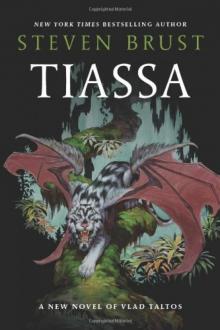 Tiassa
Tiassa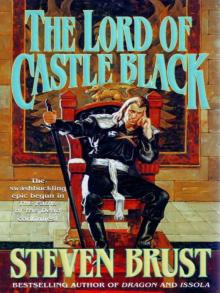 The Lord of Castle Black
The Lord of Castle Black To Reign in Hell: A Novel
To Reign in Hell: A Novel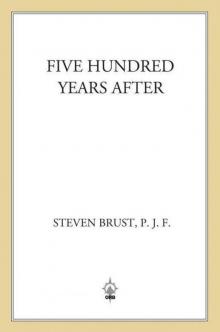 Five Hundred Years After (Phoenix Guards)
Five Hundred Years After (Phoenix Guards) The Book of Dzur: Dzur ; Jhegaala
The Book of Dzur: Dzur ; Jhegaala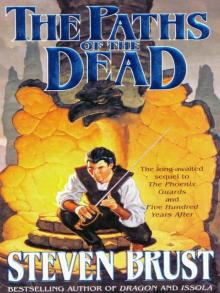 The Paths of the Dead
The Paths of the Dead Jhegaala
Jhegaala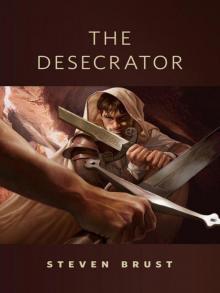 The Desecrator: A Tor.com Original
The Desecrator: A Tor.com Original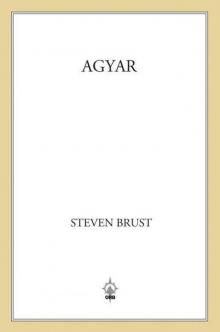 Agyar
Agyar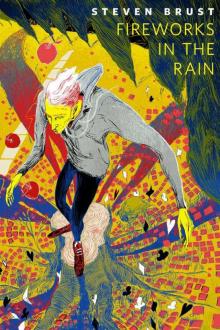 Fireworks in the Rain
Fireworks in the Rain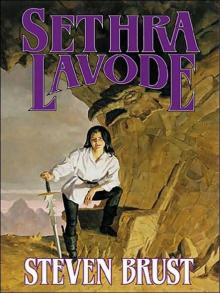 Sethra Lavode
Sethra Lavode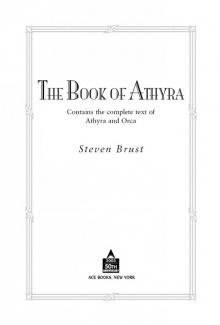 The Book of Athyra
The Book of Athyra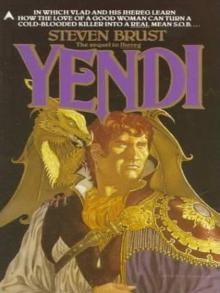 Yendi
Yendi Good Guys
Good Guys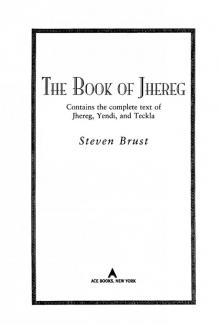 The Book of Jhereg
The Book of Jhereg Cowboy Feng's Space Bar and Grille
Cowboy Feng's Space Bar and Grille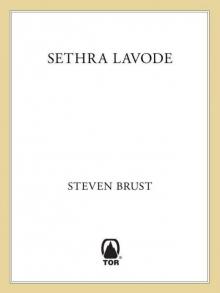 Sethra Lavode (Viscount of Adrilankha)
Sethra Lavode (Viscount of Adrilankha) My Own Kind of Freedom
My Own Kind of Freedom Dzur (Vlad Taltos)
Dzur (Vlad Taltos)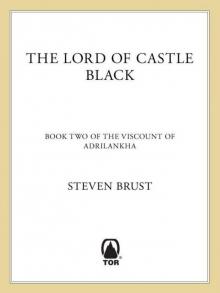 The Lord of Castle Black: Book Two of the Viscount of Adrilankha
The Lord of Castle Black: Book Two of the Viscount of Adrilankha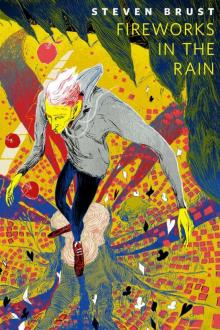 Fireworks in the Rain: A Tor.Com Original
Fireworks in the Rain: A Tor.Com Original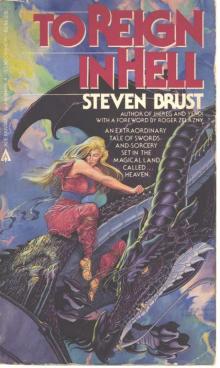 To Reign In Hell
To Reign In Hell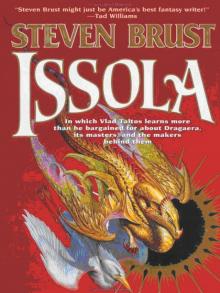 Issola
Issola Orca
Orca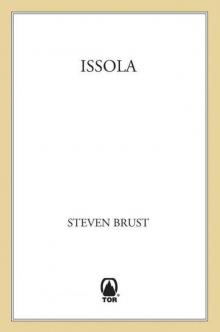 Issola (Vlad Taltos)
Issola (Vlad Taltos)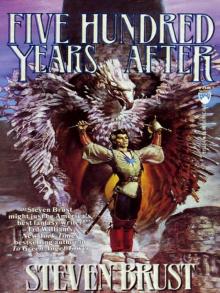 Five Hundred Years After
Five Hundred Years After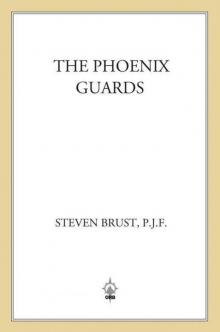 The Phoenix Guards
The Phoenix Guards Taltos
Taltos![[Vlad Taltos 06] Athyra Read online](http://i1.bookreadfree.com/i1/03/24/[vlad_taltos_06]_athyra_preview.jpg) [Vlad Taltos 06] Athyra
[Vlad Taltos 06] Athyra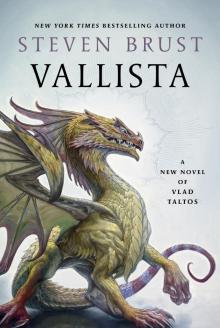 Vallista--A Novel of Vlad Taltos
Vallista--A Novel of Vlad Taltos The Incrementalists
The Incrementalists![[Vlad Taltos 04] Taltos Read online](http://i1.bookreadfree.com/i/03/24/[vlad_taltos_04]_taltos_preview.jpg) [Vlad Taltos 04] Taltos
[Vlad Taltos 04] Taltos![[Vlad Taltos 03] Teckla (v 1.1) Read online](http://i1.bookreadfree.com/i1/03/27/[vlad_taltos_03]_teckla_v_1_1_preview.jpg) [Vlad Taltos 03] Teckla (v 1.1)
[Vlad Taltos 03] Teckla (v 1.1)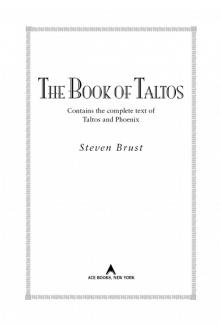 The Book of Taltos
The Book of Taltos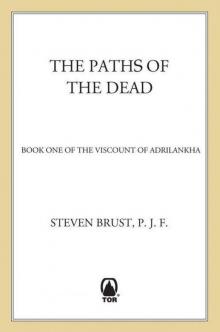 The Paths of the Dead (Viscount of Adrilankha)
The Paths of the Dead (Viscount of Adrilankha) Jhegaala (Vlad Taltos)
Jhegaala (Vlad Taltos)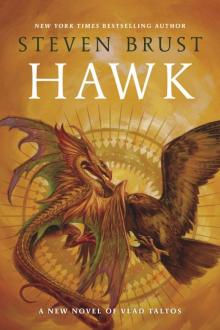 Hawk (Vlad)
Hawk (Vlad)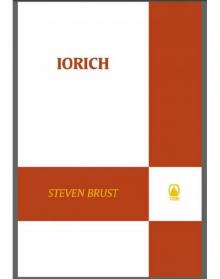 Iorich
Iorich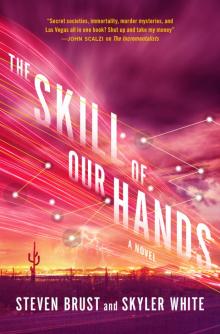 The Skill of Our Hands--A Novel
The Skill of Our Hands--A Novel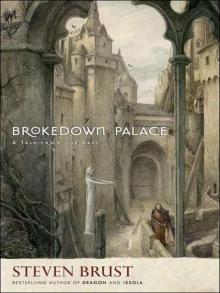 Brokedown Palace
Brokedown Palace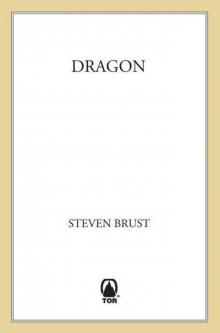 Dragon (Vlad Taltos)
Dragon (Vlad Taltos) Dragon
Dragon Athyra
Athyra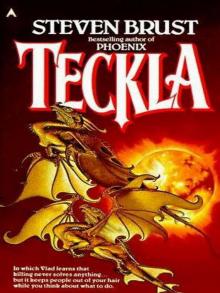 Teckla
Teckla Dzur
Dzur